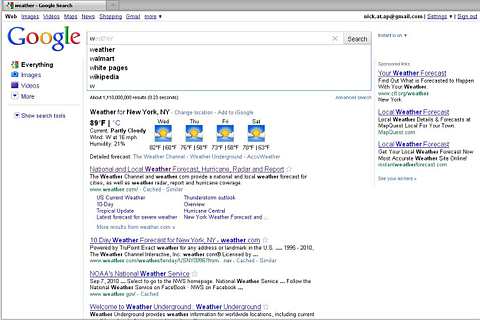YOU can now instantly do a search on Google. Wait. You could already do that previously, couldn’t you?
I mean, just type in your search term at google.com, hit enter and instantly a page full of search results would appear, right?
Well, apparently the smart folks at Google didn’t think this was instant enough. Last week, they launched a new product called Google Instant (www.google.com/instant) so you can actually see search results changing as you type in your search terms.
It works like this: let’s say — hypothetically — I’m really narcissistic and love to run Google searches about myself. What Google Instant does is as I’m typing out my name, search results will appear automatically from when I hit the letter ”D”. As I progress to ”D-A”, search results change. And again, and again right until I finally reach the final search term at ”David Lian”.
The benefit to this is that you’ll get to see what search results your terms are returning as you type and can easily tweak or refine your searches without having to hit enter and waiting for a new page to load each time.

Google claims that it will save about 2.5 seconds off every search, 11 hours of human time every second, and 350 million hours of user time every year!
The irony though is that Google Instant is not exactly instantly available. Google’s started rolling out this new service to ”selected users” and it should be widely available over the next couple of weeks.
For some country-specific Google sites, users will have to sign-in to Google to take advantage of this feature.
But fret not, while Google Instant might not be available to you right this instant (pun intended), the rest of the web is starting to catch on the ”instant” craze and unofficial mashups for instant-searching YouTube, Google Maps, Google Images and Twitter are already put out.
The unofficial YouTube Instant (check it out at www.feross.net/instant), in particular, is quite an interesting mashup. Created by Feross Aboukhadijeh of Stanford University, the simple site consists of a video box and a search bar. Entering any kind of text automatically gets the video playing with (what I assume to be) the first result of a search on the current text in the search bar. And as you continue entering text, the video will change with the text you type. I’ve found it to be a great way to browse videos and discover some new content — the big screen means I’m not overwhelmed with information.
What’s interesting though is the impact of more and more ”instant” web-products like Google Instant on culture and the way we live. It seems eerily familiar to me considering three decades ago (or so) people were discussing the effects of instant noodles, coffee and microwave TV dinners.
Along the way, we’ve seen the advent of one-click-shopping (Amazon), fast food on wheels (McDelivery), Instant Messaging, and the Internet itself — that puts more information than we can consume in our lifetimes an instant away.
I’m all for saving time, but it’s worth a pause (perhaps with that 2.5 seconds you just saved thanks to Google Instant), to ponder if we’ve become too accustomed and too reliant on having what we want right now, and the effect this is having on our (youth) culture.
And if we will start having technology systems that run too fast for our own biological bodies to play catch up? I’m really wondering how much faster we can get and if we will ever hit a limit.
Google Instant has shown us how even the fastest search engine can be made faster, but really, how much more can we squeeze in?
I guess only time will tell if that nano-second is worth saving.
David Lian is more of a take-it-slow kind of guy. Follow him on Twitter at http://www.twitter.com/davidlian and don’t get left behind.


Tell us what you think!